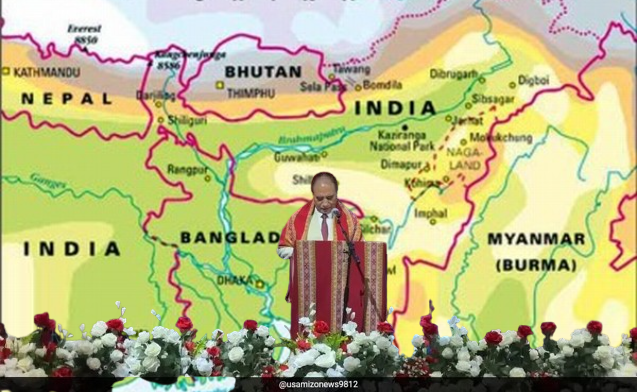
Mizoram Chief Minister Mr Lalduhoma went on an official state visit to the United States of America in the first week of September. One of his statements from the visit has since gone viral, as he spoke about the unity of the Zo people and demanded their unity under one administration and mentioned that they have faced discrimination, which indirectly meant that the CM urged for a separate state for the Zo people. It is important to understand that the “Zo people” he referred to are a community residing in areas spanning India and Myanmar. Notably, Mizoram itself is a state with a significant Christian population, with about 87-88% of the Zo community following the Christian faith.
What makes Mr. Lalduhoma’s statement particularly interesting is the timing as it comes only months after a significant statement from Bangladesh’s Prime Minister Sheikh Hasina. Earlier this year, Sheikh Hasina publicly commented on the idea that the United States might support the establishment of a Christian-majority nation for the Zo community, located between India, Myanmar, and Bangladesh. Following Lalduhoma’s statement, many have begun to speculate that there may be truth to Sheikh Hasina’s comments.
There are many questions regarding the statement made by the Chief Minister. Firstly, it was made in the United States of America. A key question is why Mr. Lalduhoma, as a Chief Minister who is accountable to the central government, chose to make this statement abroad. India’s federal system grants the central government significant authority over states, especially in matters concerning national interest.
The fact that this statement was made in the United States raises questions. If Mr. Lalduhoma had concerns or issues relevant to India, it would have been more appropriate for him to address them with the Government of India or with the Indian people. The United States is a separate country and does not have any direct role in India’s internal affairs or domestic interests.
Secondly, under the Indian Constitution, a Chief Minister does not have the authority to demand a separate state or territory. The inclusion or exclusion of any territory within India falls exclusively under the jurisdiction of the central Parliament. Therefore, while Mr. Lalduhoma may have voiced certain aspirations, the state government does not have the authority to call for secession or to make decisions regarding the reorganization of territories within India.
This statement by Mizoram Chief Minister Lalduhoma coincides with warnings previously mentioned by Bangladesh’s Prime Minister Sheikh Hasina. She stated that the United States might be attempting to carve out a Christian state from territories in Bangladesh, India, and Myanmar. Now, Chief Minister Lalduhoma’s statement about a separate Zo country, made in the United States, clearly links the United States to these ongoing developments in the South Asian region.
An intriguing point is that Sheikh Hasina suggested the idea of a “Zo country” that could be formed by carving out territories from India, Myanmar, and Bangladesh. It is notable that each of these regions, with significant Zo populations, is currently experiencing instability. In Bangladesh, there are political tensions, especially with recent challenges to Sheikh Hasina’s leadership. Myanmar has faced continuous unrest since the 2021 coup. Meanwhile, in India, ongoing ethnic conflicts, particularly in Manipur between the Meitei and Kuki communities, have led to significant unrest from 2020 through 2023.
These simultaneous conflicts, disturbances, and instability in Zo-dominated areas in Manipur, Myanmar, and politically unstable regions in Bangladesh may not be a mere coincidence. They hint at a possible larger strategy that might be fueling unity among the Kuki people, potentially encouraging them to mobilize for a greater call for unity and possibly even a separate state.
Impact of Trump’s Presidency
It is expected that with Donald Trump’s return as President and his close relationship with Prime Minister Modi, he may not advocate for ideas that go against India’s interests. Trump’s primary focus lies in the Indo-Pacific region, particularly in countering China, and he will likely approach this strategy with careful consideration of India’s position.
Sovereignty and integrity are the most important aspects of any country, and the Indian government should be fully engaged with all developments where there may be attempts to undermine India’s unity. The government must remain vigilant against any efforts to disrupt national unity. Additionally, any external interference in the region should be rightfully called out.
Aayush Pal is a freelance writer on contemporary geopolitical developments. The views expressed in his work are entirely his own.
